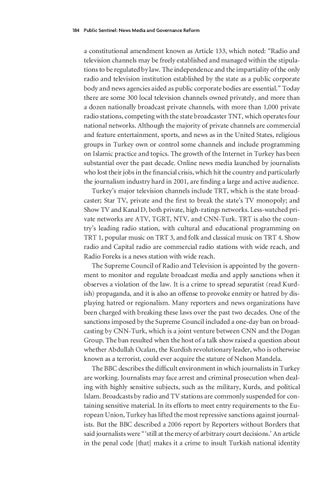184 Public Sentinel: News Media and Governance Reform
a constitutional amendment known as Article 133, which noted: “Radio and television channels may be freely established and managed within the stipulations to be regulated by law. The independence and the impartiality of the only radio and television institution established by the state as a public corporate body and news agencies aided as public corporate bodies are essential.” Today there are some 300 local television channels owned privately, and more than a dozen nationally broadcast private channels, with more than 1,000 private radio stations, competing with the state broadcaster TNT, which operates four national networks. Although the majority of private channels are commercial and feature entertainment, sports, and news as in the United States, religious groups in Turkey own or control some channels and include programming on Islamic practice and topics. The growth of the Internet in Turkey has been substantial over the past decade. Online news media launched by journalists who lost their jobs in the financial crisis, which hit the country and particularly the journalism industry hard in 2001, are finding a large and active audience. Turkey’s major television channels include TRT, which is the state broadcaster; Star TV, private and the first to break the state’s TV monopoly; and Show TV and Kanal D, both private, high-ratings networks. Less-watched private networks are ATV, TGRT, NTV, and CNN-Turk. TRT is also the country’s leading radio station, with cultural and educational programming on TRT 1, popular music on TRT 3, and folk and classical music on TRT 4. Show radio and Capital radio are commercial radio stations with wide reach, and Radio Foreks is a news station with wide reach. The Supreme Council of Radio and Television is appointed by the government to monitor and regulate broadcast media and apply sanctions when it observes a violation of the law. It is a crime to spread separatist (read Kurdish) propaganda, and it is also an offense to provoke enmity or hatred by displaying hatred or regionalism. Many reporters and news organizations have been charged with breaking these laws over the past two decades. One of the sanctions imposed by the Supreme Council included a one-day ban on broadcasting by CNN-Turk, which is a joint venture between CNN and the Dogan Group. The ban resulted when the host of a talk show raised a question about whether Abdullah Ocalan, the Kurdish revolutionary leader, who is otherwise known as a terrorist, could ever acquire the stature of Nelson Mandela. The BBC describes the difficult environment in which journalists in Turkey are working. Journalists may face arrest and criminal prosecution when dealing with highly sensitive subjects, such as the military, Kurds, and political Islam. Broadcasts by radio and TV stations are commonly suspended for containing sensitive material. In its efforts to meet entry requirements to the European Union, Turkey has lifted the most repressive sanctions against journalists. But the BBC described a 2006 report by Reporters without Borders that said journalists were “ ‘still at the mercy of arbitrary court decisions.’ An article in the penal code [that] makes it a crime to insult Turkish national identity
